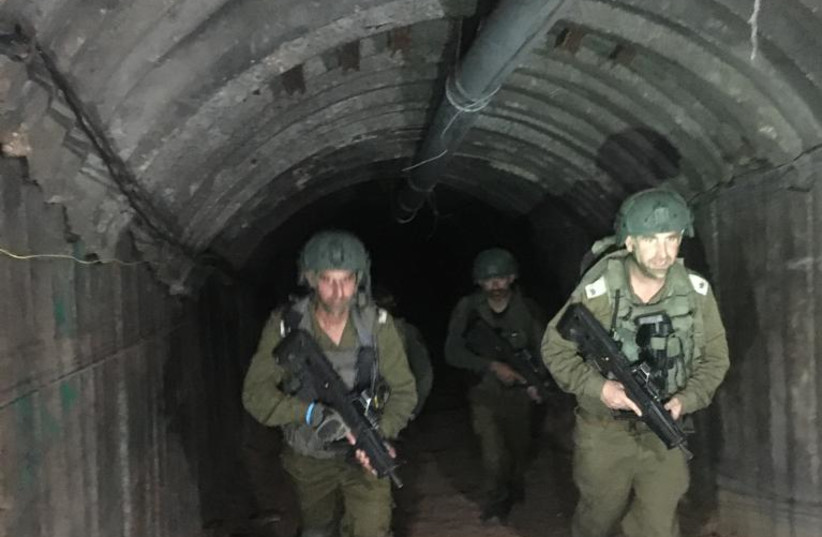After conquering a Hamas tunnel in the northern Gaza Strip, a group of Israeli soldiers went down it with some unusual kit in hand - not explosives, robot probes or pistols for close combat, but rather: old-style, dial-operated transistor radios.
Their mission was to descend until the devices could no longer receive AM transmissions from Israel. That point, they found, was at about 10 to 12 meters depth, generally the upper "stories" of Palestinian militants' subterranean network.
The Jan 4 experiment was ordered by their commander at the behest of Israeli Communications Minister Shlomo Karhi, who had just expanded the country's most popular broadcaster, Army Radio, from industry-standard FM into complementary AM channels.
AM's greater range meant emergency updates would have a better chance of being heard by civilians in bomb shelters. Troops in Gaza would also benefit, as they were being allowed transistor radios to keep themselves informed while being asked to surrender their cellphones lest those be geolocated by Hamas.
The tunnel experiment dangled another possibility for a country tormented with worry for 132 people held hostage by Hamas-led gunmen in the enclave: reaching out to them with custom-composed, morale-raising Army Radio broadcasts.

"It suddenly occurred to me that maybe some of those hostages also had access to transistor radios," Karhi told Reuters. "If they had the means to hear their families' voices it would have a huge value in terms of morale - and for their relatives, too."
The gambit would likely need Hamas' cooperation, a prospect its initiators hope is within the bounds of possibility.
Hamas officials in Gaza were not immediately available for comment on the idea - a testament to Palestinians' shattered infrastructure under an Israeli offensive, as well as their reluctance to release information on the hostages' conditions.
Access to TVs, radios
Of scores of hostages freed in a November truce, several said captors had allowed them limited access to TVs or radios.
One of them learned from the radio that her husband and daughter, from whom she had been separated during the Oct. 7 cross-border Hamas killing and kidnapping spree that sparked the war, had survived. For another, an Israeli broadcast was the first notification that two relatives were among the dead.
But the accounts often left unclear whether the hostages were kept just under the surface, or in tunnels well out of range, or in above-ground safe houses with regular reception. Tunnels shown to journalists by advancing Israeli forces have sometimes included upper levels of about 10 meters depth.
Asked to respond to the Army Radio initiative, ex-hostage Nili Margalit said part of her captivity was spent 40 meters underground. "It is too deep," she told Reuters, declining to discuss the matter further for fear "that the terrorists will use my words to hurt the captives that are still there."
Dan O'Shea, a former Navy SEAL and hostage coordinator for US forces in Iraq, said that while he "completely agrees" with the AM-radio initiative he saw scant chance of Hamas cooperating while Israel pursues search-and-rescue operations in Gaza.
"If Hamas knew that these radios could be picked up by Israeli forces, it's the last thing they would want," he said. "They're paranoid about anything that's going to track an IDF bomb to their position."
Peter Duffett-Smith, emeritus reader in astrophysics at the University of Cambridge's Cavendish Laboratory, said AM transistor radios, which are designed to passively receive broadcasts, cannot easily be traced. But he did not rule it out.
Most such radios use oscillators which emit faint signals, he said, "and it is possible that (these) could be detected at a distance using specialized equipment. These signals decrease rapidly with distance, especially through ground."
Asked whether Israel could mount such location operations, Army Radio director Danny Zaken said: "We cannot. It (a broadcast received by the radio) is not coming back. I mean, it's not like sonar ... It's only one-way, unfortunately."
Staving off despair
Karhi said he knew of neither Israel nor Hamas being able to track passive AM reception - hence the permission for troops in Gaza to use transistor radios.
Staving off despair or rebelliousness among the hostages might prompt captors to consider taking a risk on the radios.
But Ruth Pat-Horenczyk, a clinical psychology professor with the Hebrew University of Jerusalem, said if Hamas felt it would weaken its control of captives it would prevent them listening.
Army Radio's shift into AM is backed by the Defence Ministry's National Emergency Management Authority and Israel's largest telecom group, Bezeq. The station has been pre-recording messages by hostage families for airing several times a day.
"They're telling them: 'Stay strong. We are fighting for you. Don't worry. We'll get to you. Stay strong," Zaken said.
At a Tel Aviv rally to mark the first birthday of Kfir Bibas, the youngest of the hostages, an Army Radio reporter approached one of the baby's relatives, Yosi Shnaider, to explain the station's new reach and ask to record an interview.
He agreed: "If they are hearing us ... We want to tell you that the families love you, that no one has forgotten you."
